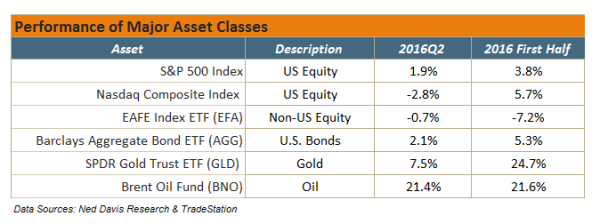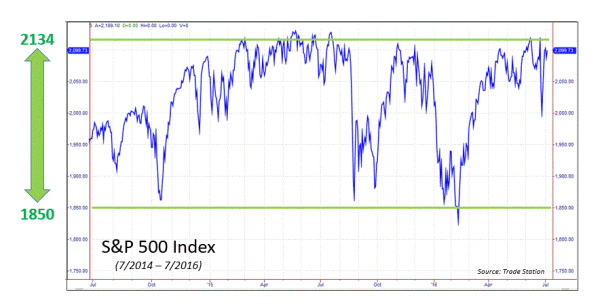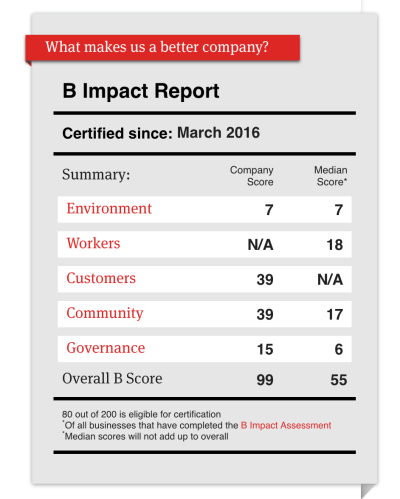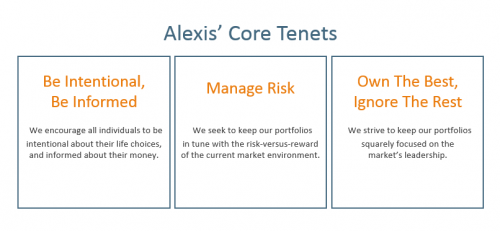The tail-end of Macbeth’s quote after the death of his wife speaks of the human condition – that life is short, filled with drama, and all of this fury often means nothing. This quote is befitting of the equity market environment over the past two years, as well as the market’s reaction to the surprise British exit from the European Union (the Brexit). What are the implications of the Brexit going forward? Will it signify something, or nothing?
The U.S. equity market performance would, at this moment, say the Brexit signifies nothing. On the news of the Brexit, the S&P 500 Index did what it has consistently done over the past nearly two years – sold off sharply for two days, then quickly reversed, returning to near all-time highs.
The real “market” news was in other asset classes. Most of the buying over the past six months has been in U.S. Treasuries and gold, likely driven by: 1) a “flight to quality,” given nervousness about the global economic environment; and 2) an expected reversal in policy of Federal Reserve Policy after the Brexit – that is, keeping interest rates “lower for longer.” Gold was up +7.5% for the Q2 (2nd quarter), and a staggering 24.7% for the six months. U.S. Treasuries, as represented by the Barclays Bond Aggregate, were +2.1% for Q2 and +5.3% for the 6 months, with longer-dated 30-year Treasuries up substantially more. The table below summarizes performance.
With so many differing opinions on the impact of the Brexit, it’s tough to keep track. The bottom line is that no one knows the potential impact – Britain hasn’t even instituted “Article 50,” which gives British negotiators two years from the notification date to conclude its leaving from the European Union (E.U.). Failure to do so would result in Britain falling out of the E.U. with no new provisions in place, unless every one of the remaining E.U. states agrees to extend the negotiations.
Unfortunately, the Brexit has created more uncertainty, not less – and markets don’t like uncertainty. However, as always there are more than a couple of ways this could go.
Rational for Higher Stocks:
- While U.S. equity markets continue to be over-valued, our stock markets are likely the “least, worst” among global markets, which may cause overseas investors to buy into our markets – and not just equities, but also Treasuries.
- Our economy continues to show the best performance among developed economies.
- We still have a “friendly Fed” – one that has indicated that it will be “data dependent” regarding the timing of raising interest rates.
Rational for Lower Stocks:
- A failure of any of the U.K. or European banks could also be a lynchpin to a significant deterioration in global equity markets.
- The correlation between U.S. equities and energy prices has been very high – when energy prices were going down, our equity markets were following suit, and vice versa. While oil prices have recovered approximately 20% from their lows over the past several months, oversupply would once again push prices back down.
- The wild card is the U.S. dollar. If the dollar moves substantially higher – which would be driven by market participants selling other currencies and buying the “greenback” (the U.S. dollar) because of its relative stability – this could destabilize US equities.
While most individual investors focus on equity markets, institutional money managers have been buying elsewhere – primarily in U.S. Treasuries and gold. Money managers are always looking at potential risk versus reward – that is, where can they put their money so that it has the most potential upside, with the least amount of downside. Why gold and Treasuries? Because they are both “safe haven” assets – if there is global shock, these assets historically have gone up. Additionally, both asset classes benefit from a declining interest rate environment.
Regardless of this sound and fury, the S&P 500 Index stubbornly continues to trade in the range of 1850 – 2134, essentially established two years ago (see below.)
We encourage individual investors to not become complacent. We believe that the Brexit will likely have an impact on global growth, but it will take time for this to become evident. In the meantime, unexpected global shocks will likely continue – with market volatility continuing.
Bull markets don’t die of old age – and we may see a push to the upside in U.S. equities. If the S&P 500 Index can break out to the upside of the above mentioned range, we would become a bit more bullish – but on a tactical basis; that is, given the stock market levels and valuation, we would likely be looking to take short-term tactical moves, rather than strategic, long-term moves.
The markets over the past two years have been very challenging, to say the least – unfortunately, we don’t see the challenges letting up anytime soon. However, as always, we will do our best to provide an investment approach that we believe to be in alignment with the potential risk-vs-reward of the markets.
Be well,
Roberta
Alexis Advisors, LLC is a Registered Investment Advisor with the Commonwealth of Virginia. Information contained herein is for informational purposes only and is subject to various interpretations and timeframes, and should not be considered investment advice. Please contact Advisor promptly if there are any changes in your financial situation or investment objectives, or if you wish to impose, add or modify any reasonable restrictions to the management of your account. Since the confidentiality of internet email cannot be guaranteed, do not include private or confidential information such as passwords, account numbers, or social security numbers. Additionally, instructions having financial consequences such as trade orders, fund transfers, etc. should not be included in your email communications, as we cannot act on unconfirmed instructions received via email. Nothing in this transmission should be construed as an offer or solicitation to purchase or sell securities. Investments in securities and insurance products are not FDIC insured, not bank guaranteed, and may lose value. Advisor’s current Disclosure Brochure is set forth on Form ADV Part 2 and is available for your review upon request.





